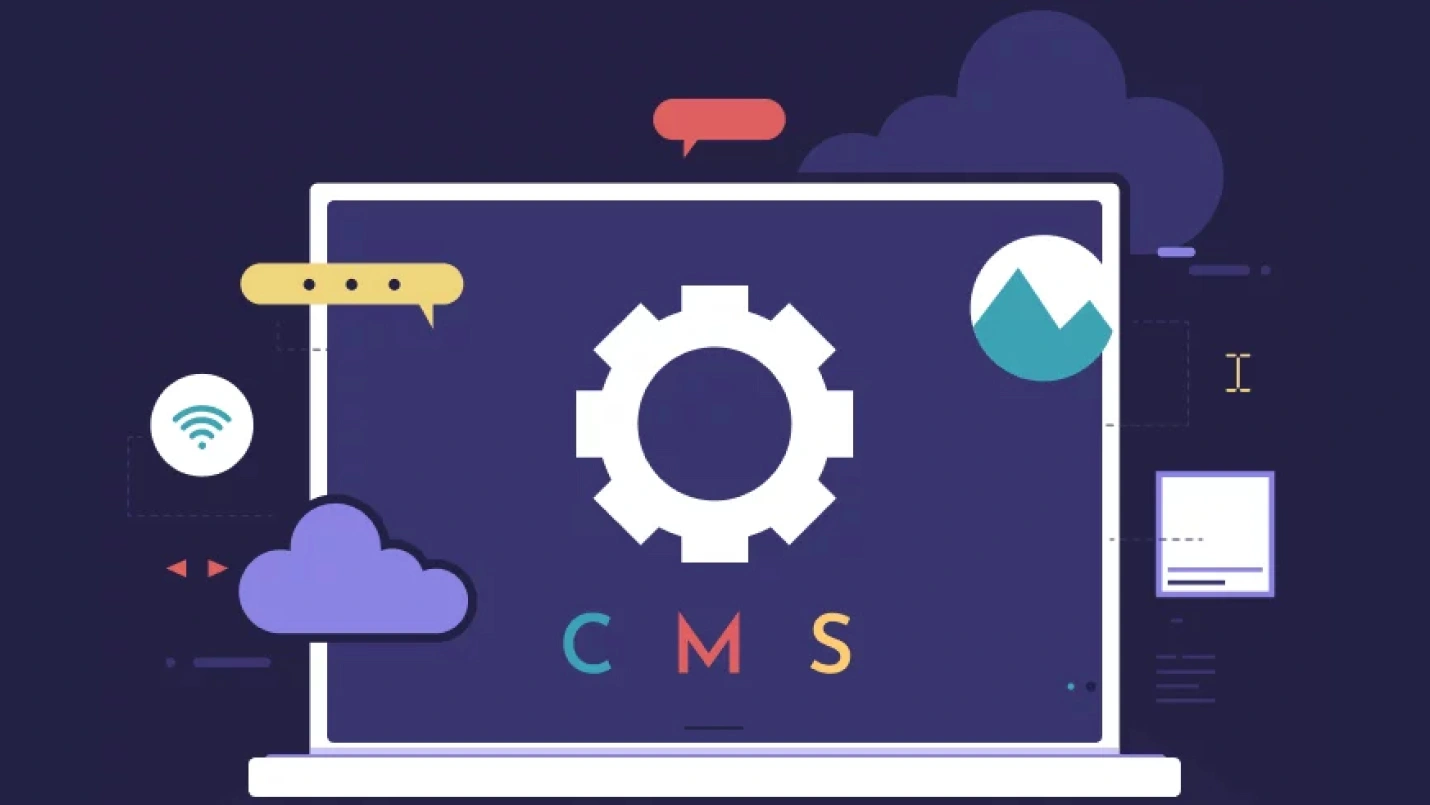Summary: An efficient CMS platform is essential for providing a flawless digital customer experience. However, choosing a suitable CMS from a long list of available options is challenging. To make it easier for you, we have compared the 10 most famous CMS platforms on vital points like pros, cons, pricing, and whether a CMS is suitable for the line of your business, etc.
When websites compete for customer attention worldwide, there’s nothing more important than a seamless digital customer experience. But what does it have to do with CMS platforms?
The key to providing a great digital customer experience is choosing a CMS platform that helps you understand and serve your customers best. The right CMS platform can help you create and deliver personalized content, optimize your website for search engines, and improve your website’s performance.
However, with several CMS dxp digital experience platforms, selecting the one that caters to your customer’s needs and offers them the best digital experience is challenging. To help you make the right decision, we have compared the features, benefits, and drawbacks of the top 10 CMS platforms.
What are the must-have features for enterprise CMS platforms?
An ideal enterprise CMS platform unifies campaigns, channels, visitor information, and performance management into a single integrated marketing tool. It also integrates seamlessly with your core systems like CRM, ad-serving platforms, or web portals that help you manage your business processes.
Hence, while choosing a CMS platform, you must look from both marketing and IT perspectives. Here are some functionalities that you can use as a starting point for evaluating a CMS platform:
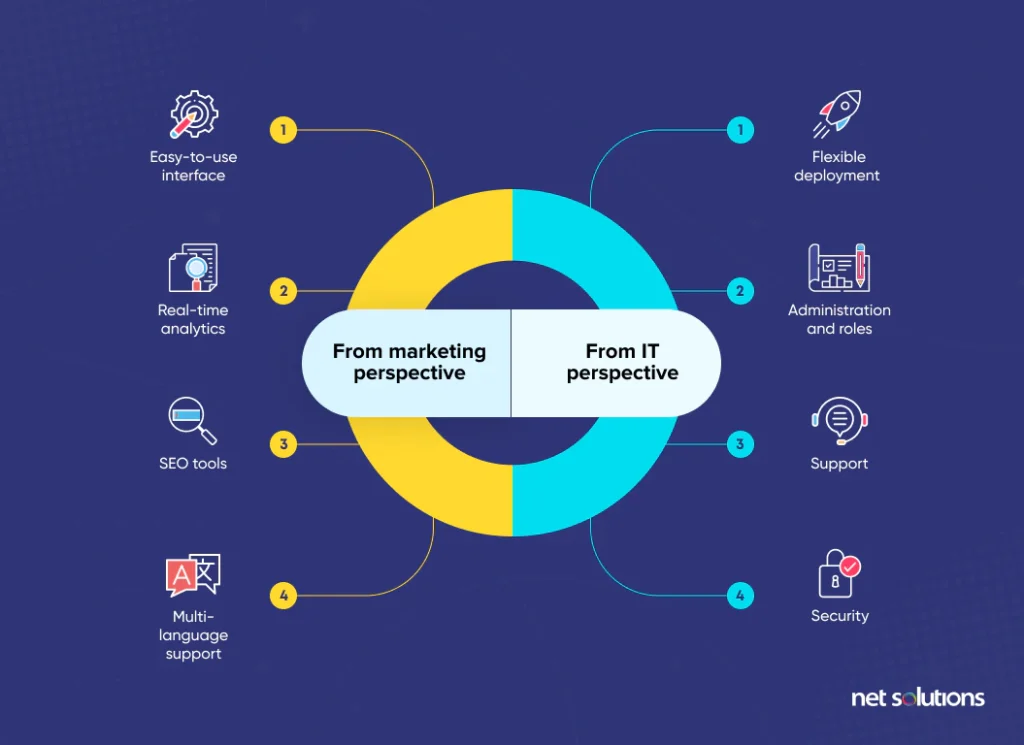
10 most popular CMS platforms to create a website
Considering the ideal CMS platform features mentioned above, here are ten best CMS platform examples with their pros, cons, and the types of businesses they’re best suited for.
1. WordPress
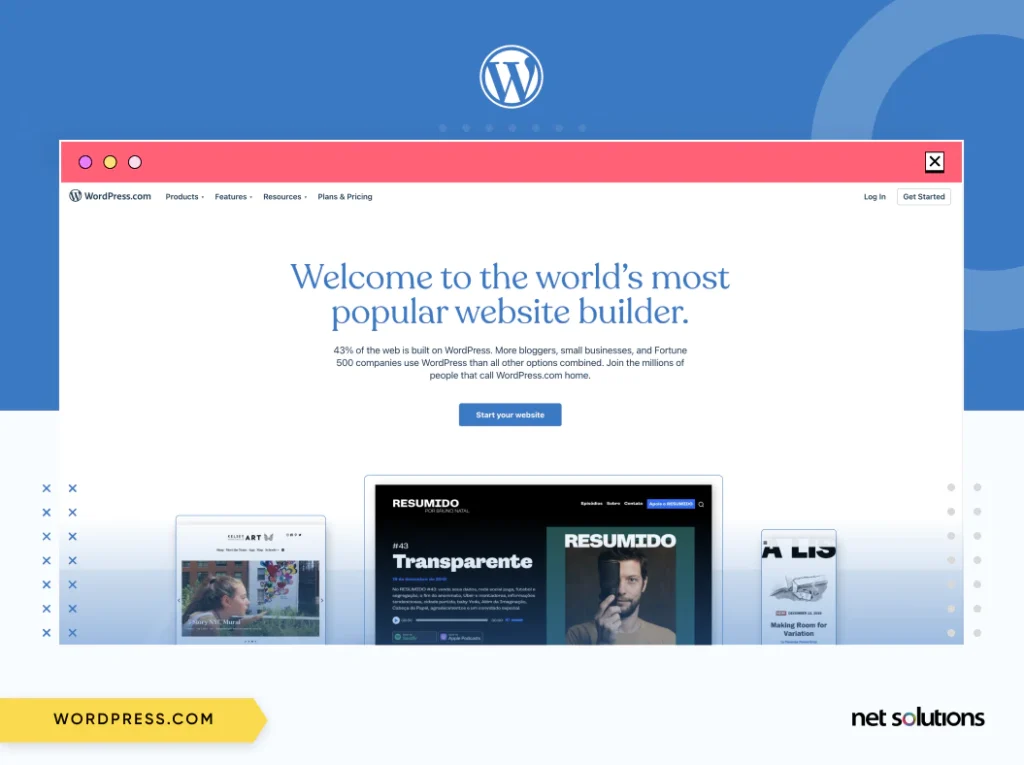
WordPress is an open-source CMS platform that powers around 34,896,678 live websites worldwide, making up 43% of the total market share. Popular websites around the globe use it, including biggies like the Walt Disney Company, Guggenheim, TechCrunch, and BBC America.
Pros of WordPress
- First and foremost, you can easily customize hundreds of feature plugins and themes to your business needs.
- Simple and constant codes make it easy for Google to index and help rank high in search engines.
- Easy to use. Even people with basic HTML knowledge can add and edit content in WordPress.
- You get the benefit of responsive web technology.
- Seamless integration with social networks.
- Last but not the least, you can easily add new features, update your website’s design, and publish content on the go.
Cons of WordPress
- WordPress can be tricky for newcomers. Especially maneuvering around the admin panel has a bit of a learning curve.
- Since WordPress is every hacker’s dream, you must keep up with version updates. Skipping even one update can open you to new types of attacks.
WordPress pricing
Since WordPress is open-source, it is free to download and use. However, you must purchase a domain and hosting to create and upload your website. The domain can cost you $9 to $15 per year. Plugins are available. Pricing of themes generally ranges from $15 to $60+.
Which businesses should use WordPress?
Any business can use WordPress, such as service-based enterprises, tech-focused start-ups, retail stores, or news publications. However, eCommerce websites need special plugins like WooCommerce.
2. Squarespace
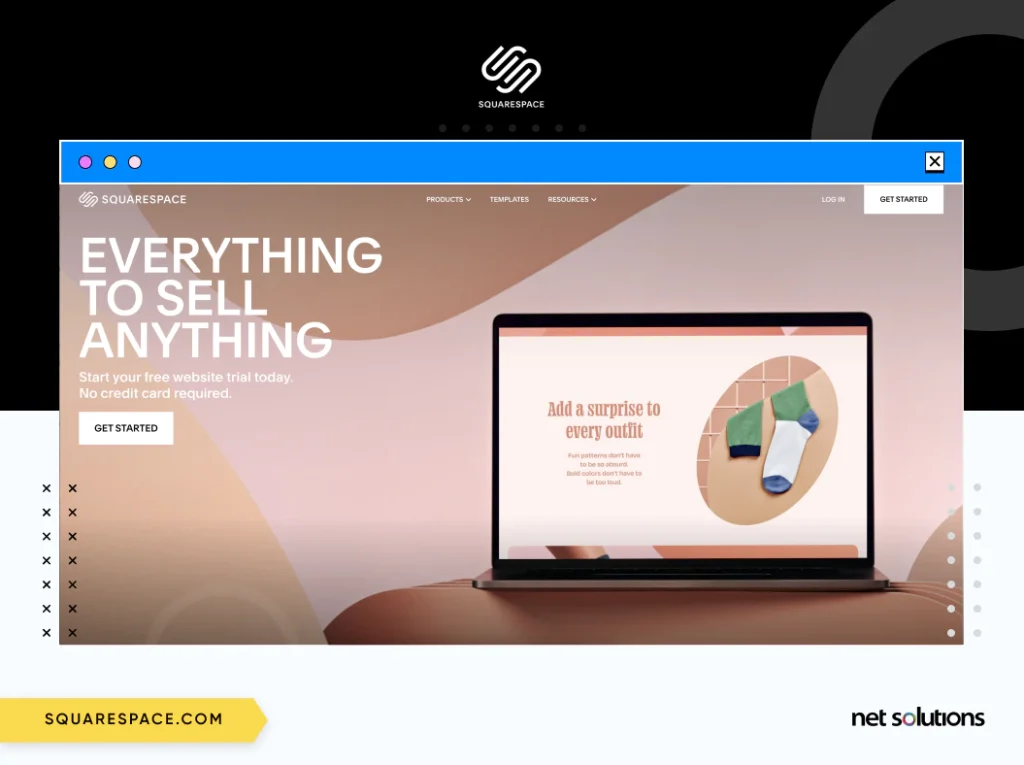
Squarespace is responsible for fuelling 2,927,000+ websites around the globe, and it is an ideal CMS platform for beginners. Hence, it is popular among creative professionals who use it to showcase their portfolios. Etsy, UberEatEats, StyleCaster, and DoorDash are using it. The Squarespace CMS has a market share of 4%.
Upsides of SquareSpace
- Squarespace is a drag-and-drop website-building platform that doesn’t need any installation on the hosting server.
- The CMS has built-in SSL certificates, support, and other features.
- Squarespace has clear, modern templates with simplicity and elegance at the center of its aesthetics.
- The enterprise CMS is easy-to-use. It also offers video tutorials if you face any difficulty.
Downsides of SquareSpace
Squarespace doesn’t offer many customization options like WordPress. So, if you’re an established business that wants a customized website, Squarespace may not be the suitable CMS for you.
Squarespace Price
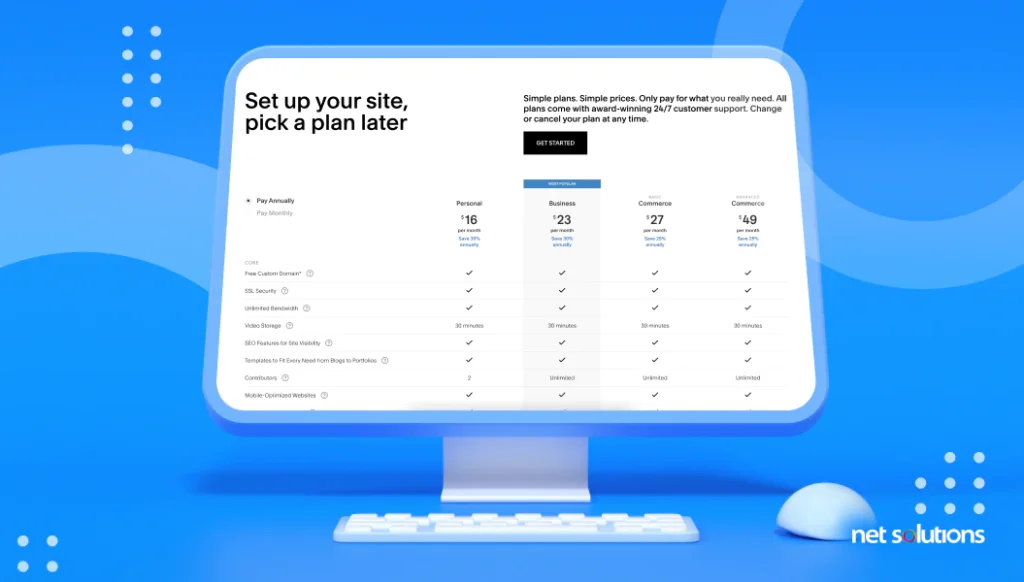
Which businesses should use Squarespace?
SquareSpace is ideal for designers, photographers, or musicians who want to create a portfolio website. Restaurants, online stores, and professional service vendors who want a simple website to promote their business can also use it.
3. HubSpot CMS Hub
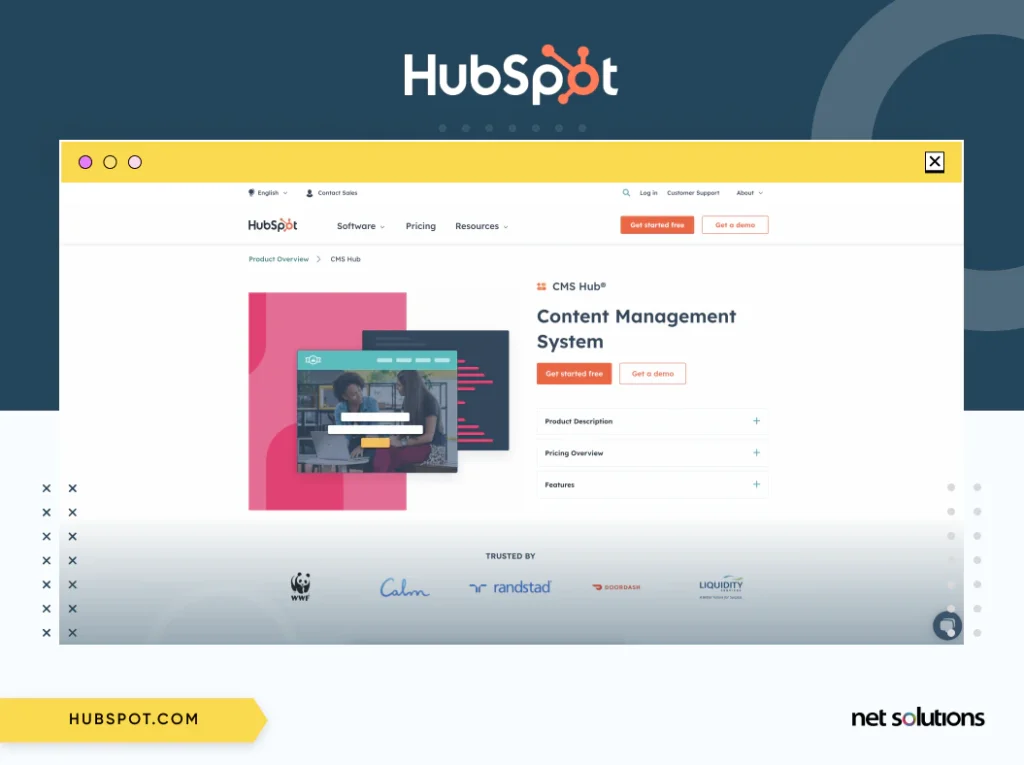
HubSpot has designed the CMS hub for marketers and businesses that want to turn your websites to boost their conversions. Since it’s built on HubSpot’s CRM platform, the HubSpot CMS hub has all the marketing automation, sales, service, and operations tools you need to grow your business or manage your website.
Here are some brands that have used the HubSpot CMS hub to fuel their website:
- Care New England is a non-profit health system running several hospitals in Rhode Island.
- Hillbrush is the largest manufacturer of brushes and hygienic cleaning products in the UK.
Advantages of HubSpot CMS Hub
- HubSpot CMS Hub is easy to use. You can get along with it even with basic HTML knowledge.
- You can personalize your web pages to specific visitors using the intelligent content features of the platform.
- The serverless functions, flexible theme options, and command line tools let you customize your website the way you want.
- The built-in security features of HubSpot CMS hub, like a global CDN and web application firewall, keep your website safe from all cyber-attacks.
- You can seamlessly integrate the HubSpot CMS hub with a sales CRM and email marketing tools to streamline your operational workflows.
Disadvantages of HubSpot CMS Hub
HubSpot CMS has limited plugins and themes, making it less suitable for websites that need greater customization, such as eCommerce.
HubSpot CMS Hub Pricing
The HubSpot CMS hub offers three pricing options:
- Starter Plan – $23/month
- Professional Plan – $360/month
- Enterprise Plan – $1200/month
The start-up plan has everything you need to build a fully-functional website. The higher plans are for building complex web apps with dynamic personalization and internal processes.
Which businesses should use HubSpot CMS Hub?
The HubSpot CMS is best for marketers and businesses that want basic websites. Other CMS platforms like WordPress, Drupal, and Joomla are better alternatives for more dynamic websites.
4. Wix

Wix powers over 7 Million live websites across the globe, making up 10% of the total CMS market share. The CMS platform is ideal for anyone who wants an all-in-one solution for creating their website from scratch.
Pros of Wix
- You can easily create and customize web pages using the drag-and-drop site builder.
- The CMS platform has a great collection of pre-made fully-responsive templates.
- You can always boost your website by integrating apps from the Wix App market.
- Wix has robust protocols to keep your website safe from cyberattacks 24×7.
- With a 99.98% uptime rate, Wix is exceptionally reliable.
Cons of Wix
- You can’t change to a different template on Wix once you’ve selected one. It means there’s no going back if you choose the wrong template for your website.
- The free version of Wix is unsuitable for creating high-function websites like an eCommerce store. Even if you get a paid plan, you can only accept payments using Authorize.net and PayPal.
- Downloading and exporting data is not easy in Wix.
- Customization is limited in Wix and might need the help of a developer.
Wix Pricing
You can use Wix for free, but then your website will have a Wix-branded domain name. The paid plan, which starts from $13 per month (annual upfront payment), is more flexible. Top-tier plans are $23/month (yearly upfront payment) or more, and they let you accept online payments.
Which businesses should use Wix?
Wix is best for solo entrepreneurs or small businesses. But if you want to build an eCommerce website, you might also want to consider other CMS platforms like Shopify and WordPress.
5. Joomla
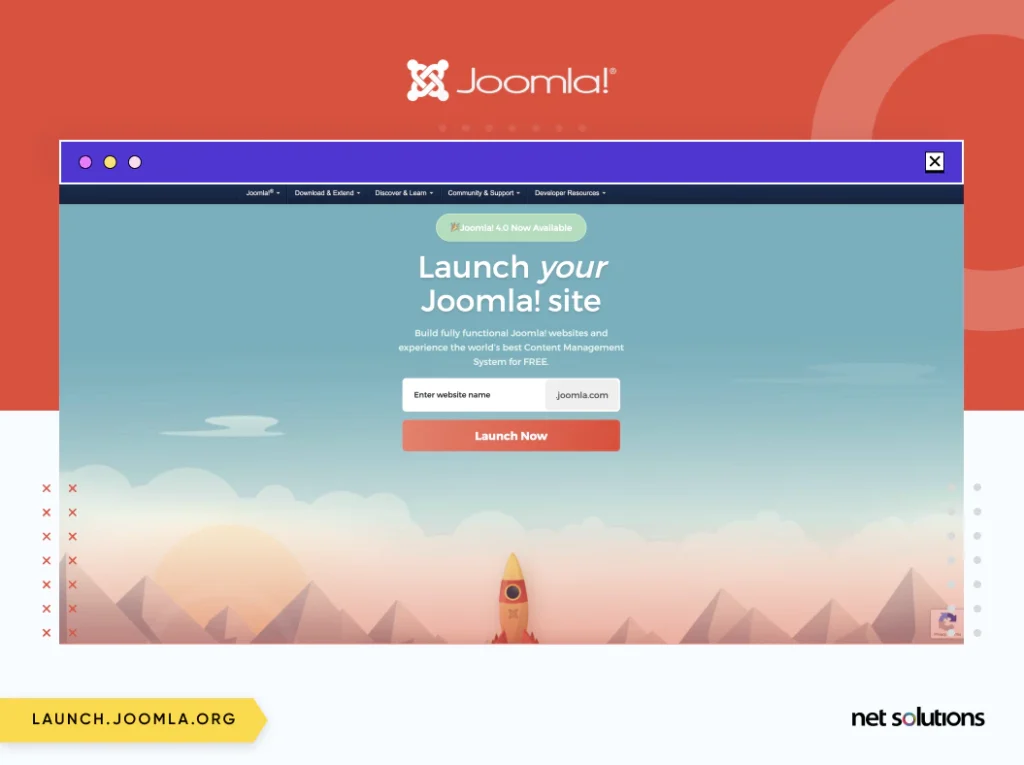
If you have an eCommerce store and desire more flexibility, Joomla is the best choice. It is also an ideal choice for developers as it comes with powerful features that you can use for creating feature-rich websites.
Around 1.5 million live websites use Joomla, making up 2.6% of the CMS market share. Even if Joomla is much less prevalent than WordPress, both enterprises share many similarities.
Benefits of Joomla
- Joomla is flexible and offers plenty of options. Hence, it is ideal if you want to customize your website.
- While Joomla is useful for developers, users who don’t have programming knowledge can also use it.
- Like WordPress, Joomla is open source and enjoys immense community support.
- The framework is extensible, flexible, and the best fit for eCommerce stores.
- Joomla is known for its SEO-friendliness and mobile support.
- With Joomla, you can efficiently manage a website with hundreds of sub-pages.
Drawbacks of Joomla
- Joomla is not as beginner-friendly as WordPress. Even avid Joomla users will admit that the CMS platform can be complex, and you may need a developer to help you.
- You may face compatibility issues if you install many different extensions and modules.
Joomla Pricing
Joomla is free, but you must pay for a domain name and hosting. Also, you would have to pay more to add more functionality to your website.
Which businesses should use Joomla?
Like WordPress, any business can use Joomla to create its website. However, it works best for professional websites managed by multiple people. A suitable example is the official website of the international tennis player Roger Federer, which displays his portfolio, a news platform, and a shop.
6. Shopify

With 3.7 million live websites and a 4.4% global CMS market share, Shopify has emerged as a leader in the eCommerce space. Many popular websites like Penguin Books, SkyMall, and Fashion Nova are built on it – making it one of the most popular CMS for eCommerce.
Advantages of Shopify
- Shopify is an all-in-one hosted CMS platform, which means there’s no need to buy hosting, install software, or worry about updates and backups.
- The straightforward drag-and-drop interface makes it easy to add, edit, and manage websites on Shopify.
Shopify’s integrated payment solution allows you to accept payment through credit and debit cards. The PayPal option is also available on Shopify. - Hundreds of extensions and themes are available on Shopify. You can also buy third-party Shopify apps to add new features to your website.
- Shopify experts can help you 24/7 through live chat, email, phone, and Twitter. Extensive documentation and online forums are also available.
Disadvantages of Shopify
- Shopify can increase your expenses, especially if you want to add third-party apps to your website.
- Certain limitations exist in Shopify.
Shopify Pricing
The least expensive Shopify plan is $29/month and only offers basic features. The most advanced plan is $299/month.
Which businesses should use Shopify?
The Shopify enterprise CMS is most suitable for building eCommerce stores, and it is not an ideal option for other websites like a company website, portfolio, or media publishing.
7. Sitecore
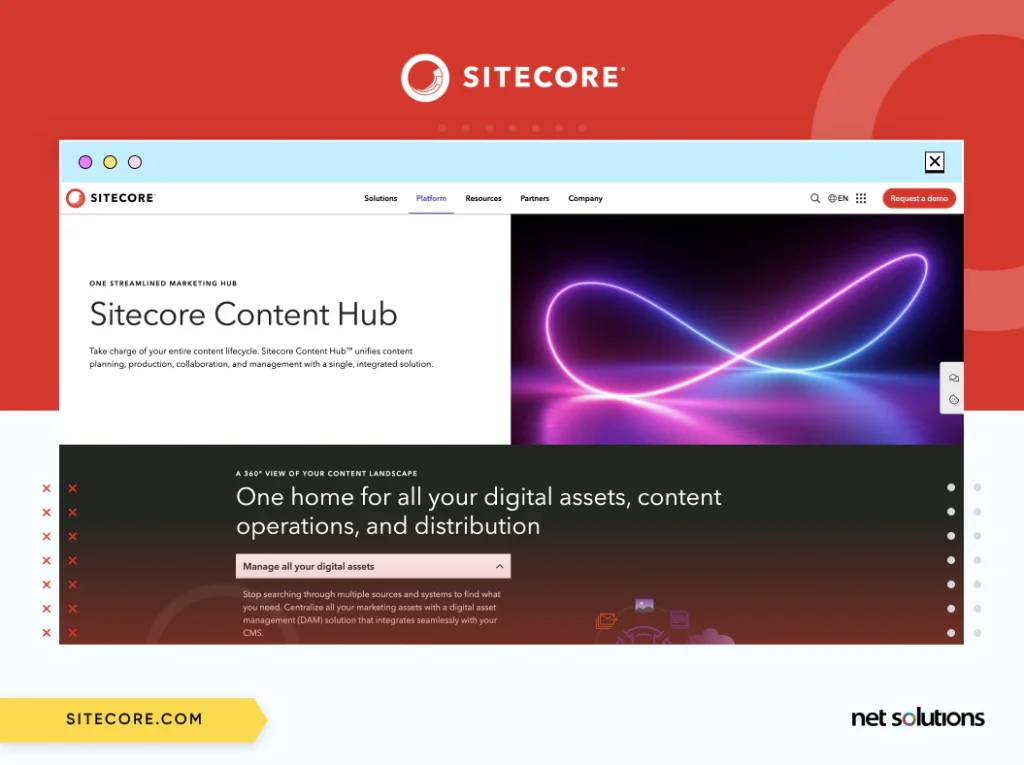
The Sitecore CMS empowers you to market your product within the context of current and past customer interactions. It also promises a personalized and relevant customer experience for your brand.
If you are searching for improved web traffic and a better user experience, you should refer to just one in this list of different CMS platforms: Sitecore. It blends content, commerce, and personalization. Hence, this is the go-to-market solution for those wishing to create seamless customer experiences across various channels.
Pros of Sitecore
- Managing large websites is easy in Sitecore as it has an intuitive interface.
- Sitecore’s integrated online marketing suite can help you efficiently manage and optimize your websites and content.
- Valuable features of Sitecore, like a/b testing, email integration, analytics and reporting, and user profiling, help you get insights into website visitor behavior and interactions.
- Sitecore has intelligent elements and cross-browser compatibility to ensure your website can seamlessly run on any web browser.
- You can set up marketing campaigns to automatically respond to visitors’ actions on your website in Sitecore.
Cons of Sitecore
- Sitecore is expensive as compared to other CMS platforms.
- You don’t enjoy the level of support, community, and updated documentation you have in other CMS platforms.
Sitecore Pricing
- Starting licensing fee of $40,000 + $8000 for each additional year.
- Implementation costs start from $65,000.
- Support and other licensing fees cost $10,000/year.
Which businesses should use Sitecore?
Sitecore is ideal for large-scale organizations with significant budgets to spare. The telecom company Huawei is a perfect example.
8. Kentico
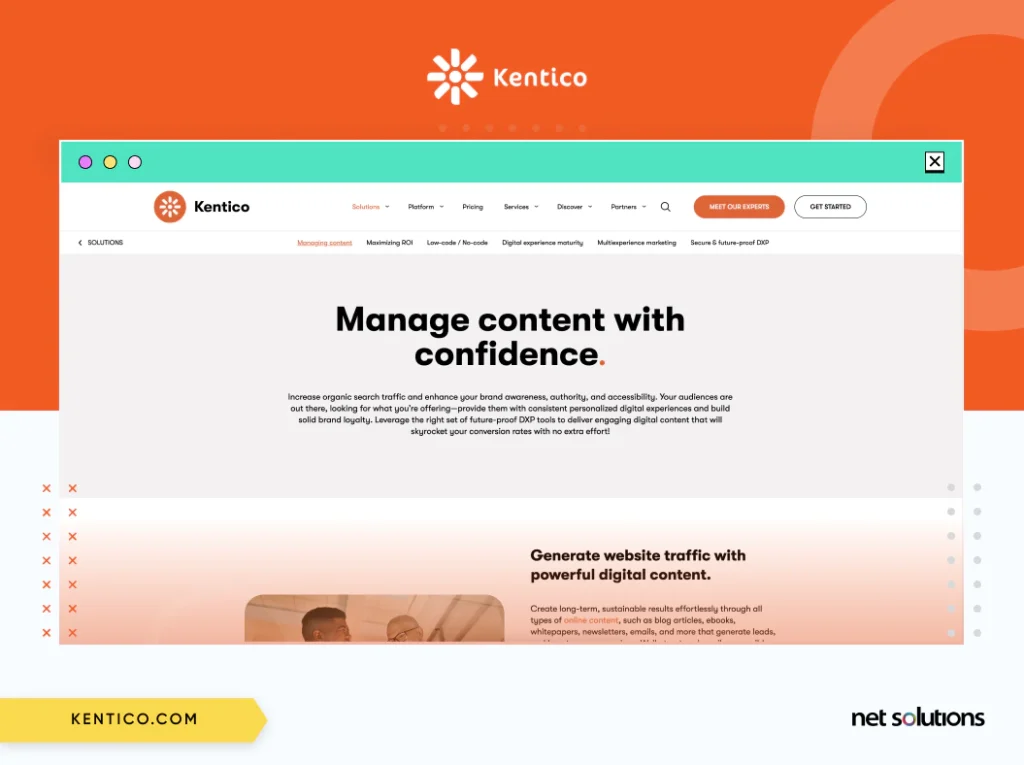
Kentico is a cloud-based CMS platform that offers a robust suite of tools to create, revise, or update content on your website. The enterprise CMS has an online GUI to deliver content efficiently on different digital platforms. It also has an excellent suite of marketing tools to reach more audiences and engage with visitors.
Publishers use Kentico to gain effortless control over the content. You can also use Kentico to make a global site with multilingual content to reach new markets using Kentico.
Advantages of Kentico
- You can use Kentico to publish and manage several blogs and enable the users to insert new blogs.
- Kentico can also help you create social networking groups.
- The latest security protocols and data backup features of Kentico ensure that your websites are always protected.
- The lead scoring feature of Kentico helps you gain insight into visitors’ journeys and behavior.
Disadvantages of Kentico
- Kentico is slightly more expensive than other CMS platforms.
- Working with Kentico can be challenging, especially if you’re a beginner.
Kentico Pricing
- Developer Plan: Free.
- Scale Plan: $2,449/month.
- Enterprise Plan: Customizable based on your business needs.
Which businesses should use Kentico?
Kentico is best for creating large websites with multiple functionalities. The video communication platform Skype is an ideal example of a website using the Kentico CMS.
9. Drupal
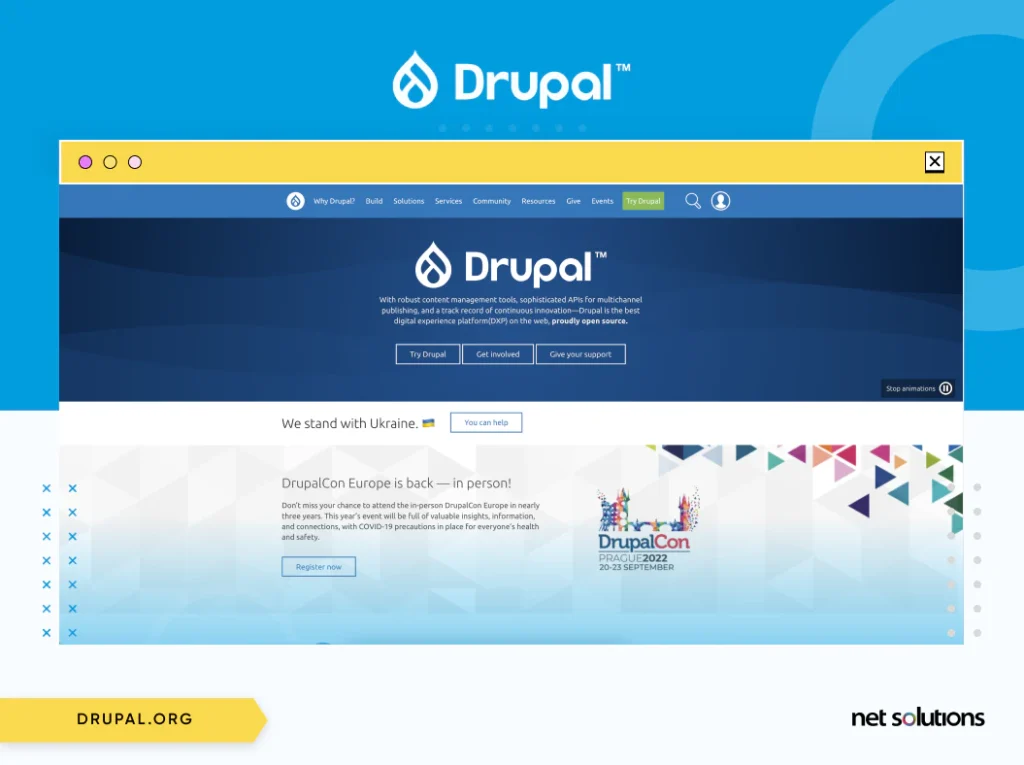
This open-source CMS platform fuels 500,000+ live websites worldwide, including several university sites and biggies like The Economist. If you want a highly customized, dynamic website and can hire brilliant developers, Drupal is a great option. You must also note that most high-traffic websites are also made on Drupal, followed by WordPress.
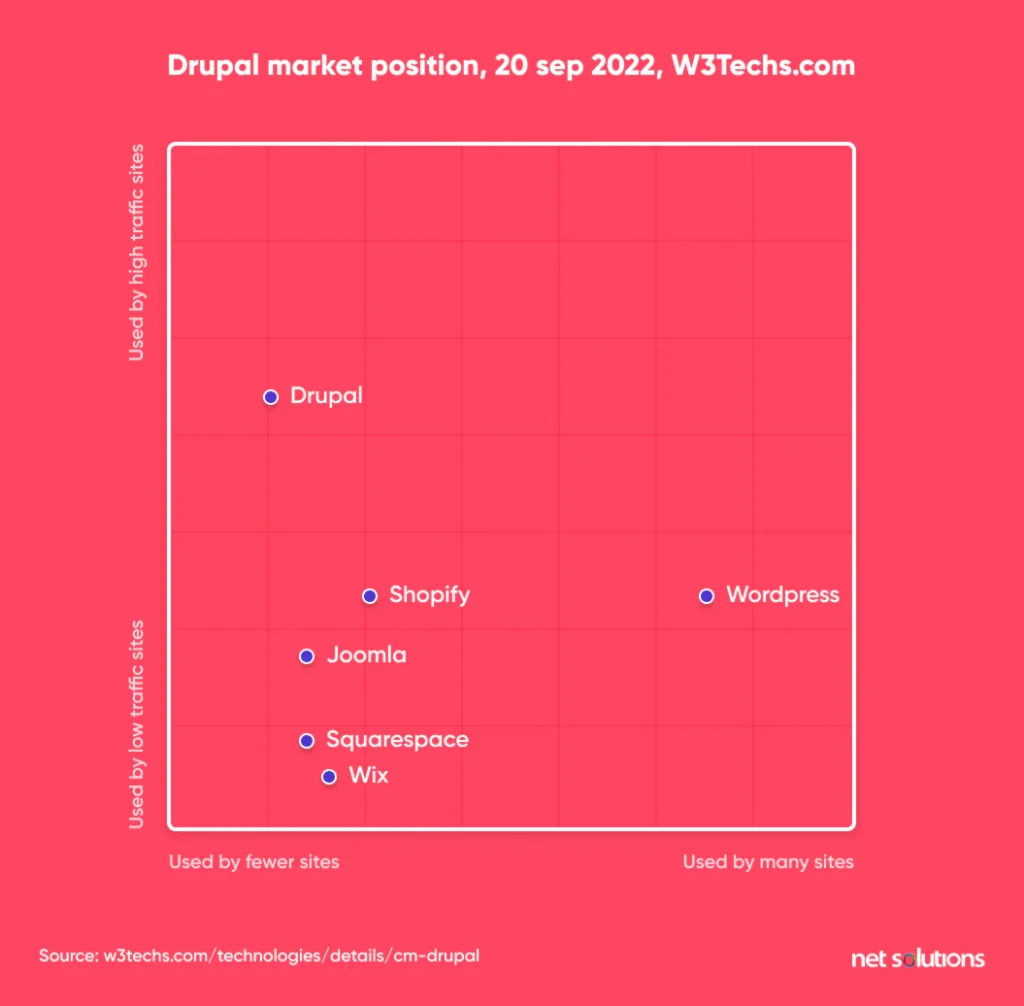
Benefits of Drupal
- Content creation is easier on Drupal as its custom content types are flexible and offer plenty of options.
- Drupal has many modules you can add to your website to enhance its functionality (these modules work like WordPress plugins).
- Like other CMS platforms like Joomla and WordPress, Drupal enjoys active community support.
- Drupal makes user management effortless with its built-in system that lets you create new roles and specify their permissions.
- Websites made in Drupal are less vulnerable to security threats as the CMS platform conducts security tests regularly.
- Drupal also has built-in modules to expand the functionality of your websites.
Drawbacks of Drupal
- Changing the appearance of your website or adding new functionalities in Drupal can be tricky.
- Most Drupal websites have heavily customized themes created by a developer, which can be expensive.
- You need extensive PHP, CSS, and HTML knowledge to work with Drupal.
- Maintenance and upgrades in Drupal can be time-consuming.
Drupal Pricing
Depending on the web hosting and the domain name, different hosting providers have other pricing plans for Drupal.
Which businesses should use Drupal?
Any business can use Drupal. However, it works best for teams with extensive technical knowledge to create large-scale websites.
10. Contentful
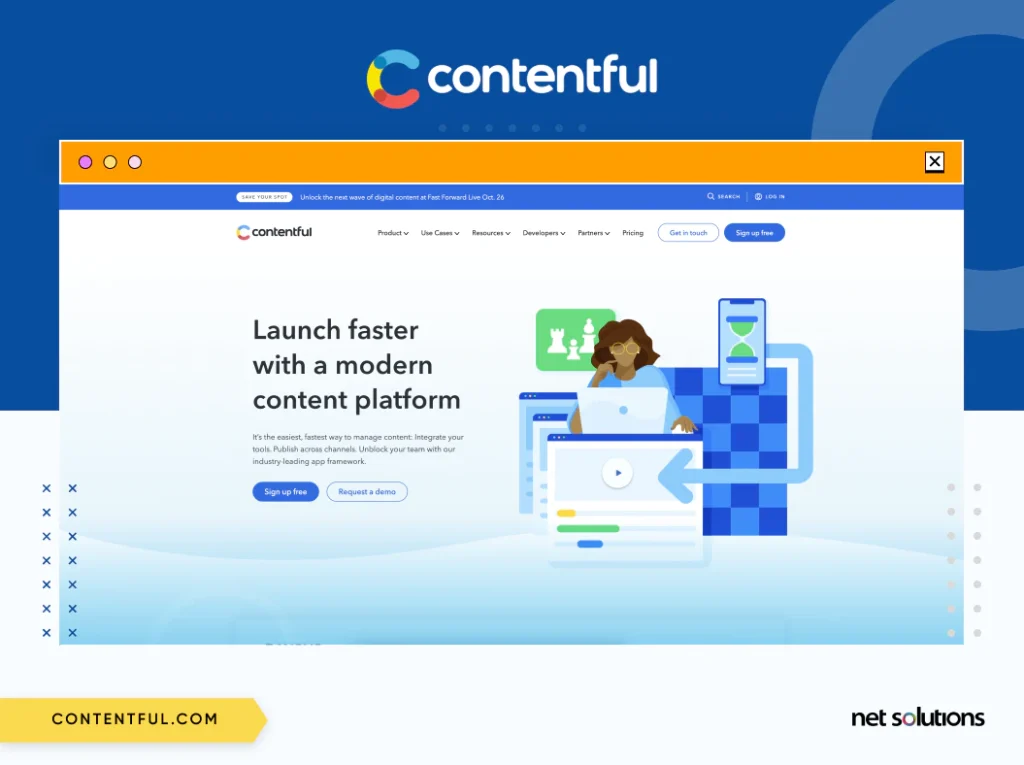
Being an API-centric content infrastructure platform, Contentful is extremely easy to use, and you get the best CMS experience.
You can store any data, including text and images. It saves software development and delivery time and lets you offer fresh experiences to your customers more often.
Pros of Contentful
- You can use Contentful to store 100% of the content you create and distribute it to any digital platform.
- The UI extensions and a rich text editor of Contentful make it easy to create and edit your website content.
- Powerful APIs make it simple to use software with no complexities.
Cons of Contentful
Contentful has a steep learning curve and requires immense technical knowledge to create content.
Contentful Pricing
The CMS platform is free for businesses with domain names and hosting providers. There’s also a pricing plan for additional tools and support, which starts from $489/month.
Which businesses should use Contentful?
Contentful is best for individuals or businesses who want to create a custom website that integrates other digital platforms.
Frequently Asked Questions
Here are a couple of reasons why Drupal is a better CMS platform than WordPress:
- Drupal has an advanced permission control system that makes managing and controlling users easy.
- The CMS platform is more flexible than WordPress.
- Multi-language support makes it an ideal choice to create a website that caters to multiple languages.
A content management system (CMS) is a platform that lets you create, publish, modify, or update content on a website. On the other hand, a website builder is an all-in-one platform for creating a website quickly.
A CMS has a bit of a learning curve but offers many customization options. It even lets you access code and customizes the content based on your requirements. However, a website builder is easier to use, but you can’t make many customizations in it.
You can decide whether to use a CMS or not based on the following scenarios:
- Intuitiveness: Is the CMS easy to understand and use?
- Flexibility: To what level can you customize the CMS?
- Beginner-friendly: Can a person without programming skills use the CMS?
- Speed & performance: How fast and efficient is the CMS?
- Security: Can the CMS keep you safe from cyber-attacks?
- How big is the CMS community, and does it provide active support?
- Compliance: Does the CMS focus on web standards and best practices?
Traditional CMS platforms follow the monolithic architecture. However, new CMS platforms (especially the ones in eCommerce) use a headless architecture that lets you update, edit, and push content anywhere, anytime.

